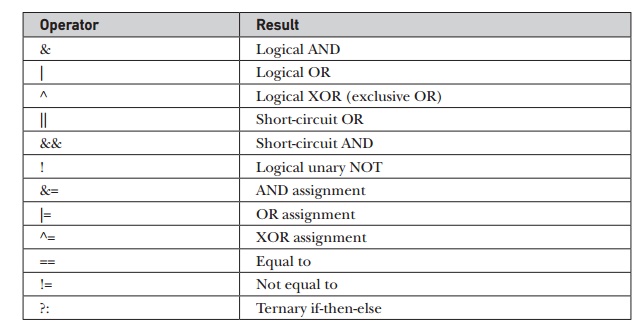Chapter: Java The Complete Reference : The Java Language : Operators
Boolean Logical Operators - Java
Boolean
Logical Operators
The Boolean logical operators
shown here operate only on boolean
operands. All of the binary logical operators combine two boolean values to form a resultant boolean value.

The logical Boolean
operators, &, |, and ^, operate
on boolean values in the same way
that they operate on the bits of an integer. The logical ! operator inverts the Boolean state: !true == false and !false ==
true. The following table shows the effect of each logical operation:

Here is a program that is
almost the same as the BitLogic
example shown earlier, but it operates on boolean
logical values instead of binary bits:
// Demonstrate the boolean
logical operators.
class BoolLogic {
public static void
main(String args[]) {
boolean a = true;
boolean b = false;
boolean c = a | b;
boolean d = a & b;
boolean e = a ^ b;
boolean f = (!a & b) | (a
& !b);
boolean g = !a;
System.out.println(" a =
" + a);
System.out.println(" b =
" + b);
System.out.println(" a|b
= " + c);
System.out.println("
a&b = " + d);
System.out.println(" a^b
= " + e);
System.out.println("!a&b|a&!b
= " + f);
System.out.println(" !a
= " + g);
}
}
After
running this program, you will see that the same logical rules apply to boolean values as they did to bits. As
you can see from the following output, the string representation of a Java boolean value is one of the literal values
true or false:
a = true b = false
a|b = true a&b = false
a^b = true
!a&b|a&!b = true !a =
false
Short-Circuit
Logical Operators
Java provides two interesting
Boolean operators not found in some other computer languages. These are
secondary versions of the Boolean AND and OR operators, and are commonly known
as short-circuit logical operators.
As you can see from the preceding table, the OR operator results in true when A is true, no matter
what B is. Similarly, the AND
operator results in false when A is false, no matter what B
is. If you use the || and && forms, rather than the | and & forms of these operators, Java will not bother to evaluate
the right-hand operand when the outcome of the expression can be determined by
the left operand alone. This is very useful when the right-hand operand depends
on the value of the left one in order to function properly. For example, the
following code fragment shows how you can take advantage of short-circuit
logical evaluation to be sure that a division operation will be valid before
evaluating it:
if (denom != 0 && num / denom > 10)
Since
the short-circuit form of AND (&&)
is used, there is no risk of causing a run-time exception when denom is zero. If this line of code
were written using the single &
version of AND, both sides would be evaluated, causing a run-time exception
when denom is zero.
It is
standard practice to use the short-circuit forms of AND and OR in cases
involving Boolean logic, leaving the single-character versions exclusively for
bitwise operations. However, there are exceptions to this rule. For example,
consider the following statement:
if(c==1 & e++ < 100) d = 100;
Here, using a single & ensures that the increment
operation will be applied to e
whether c is equal to 1 or not.
Related Topics